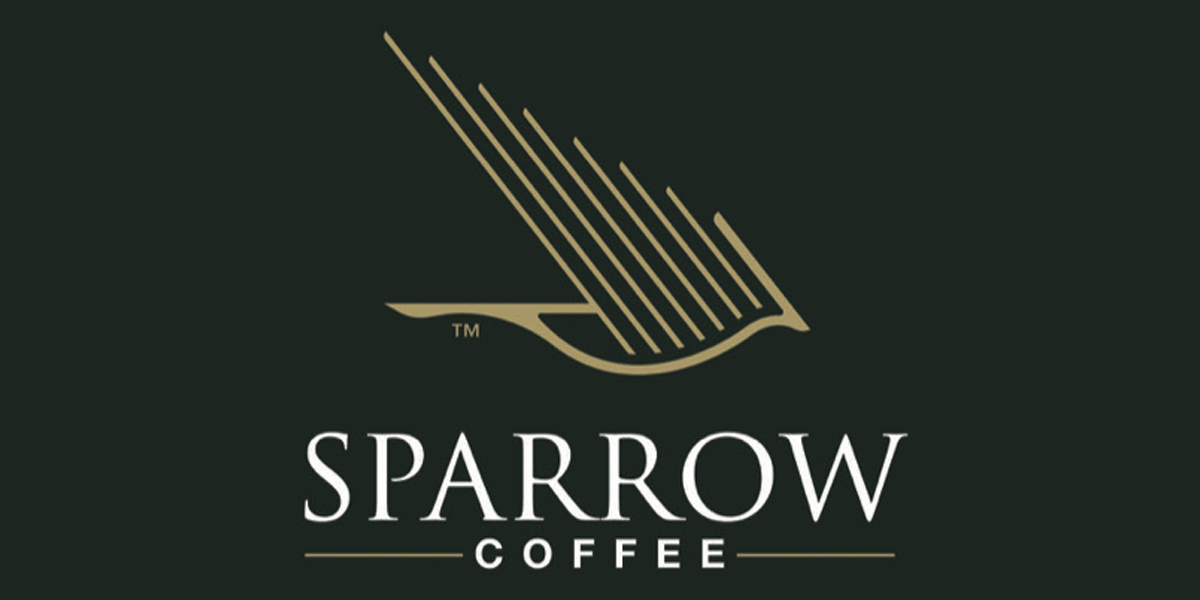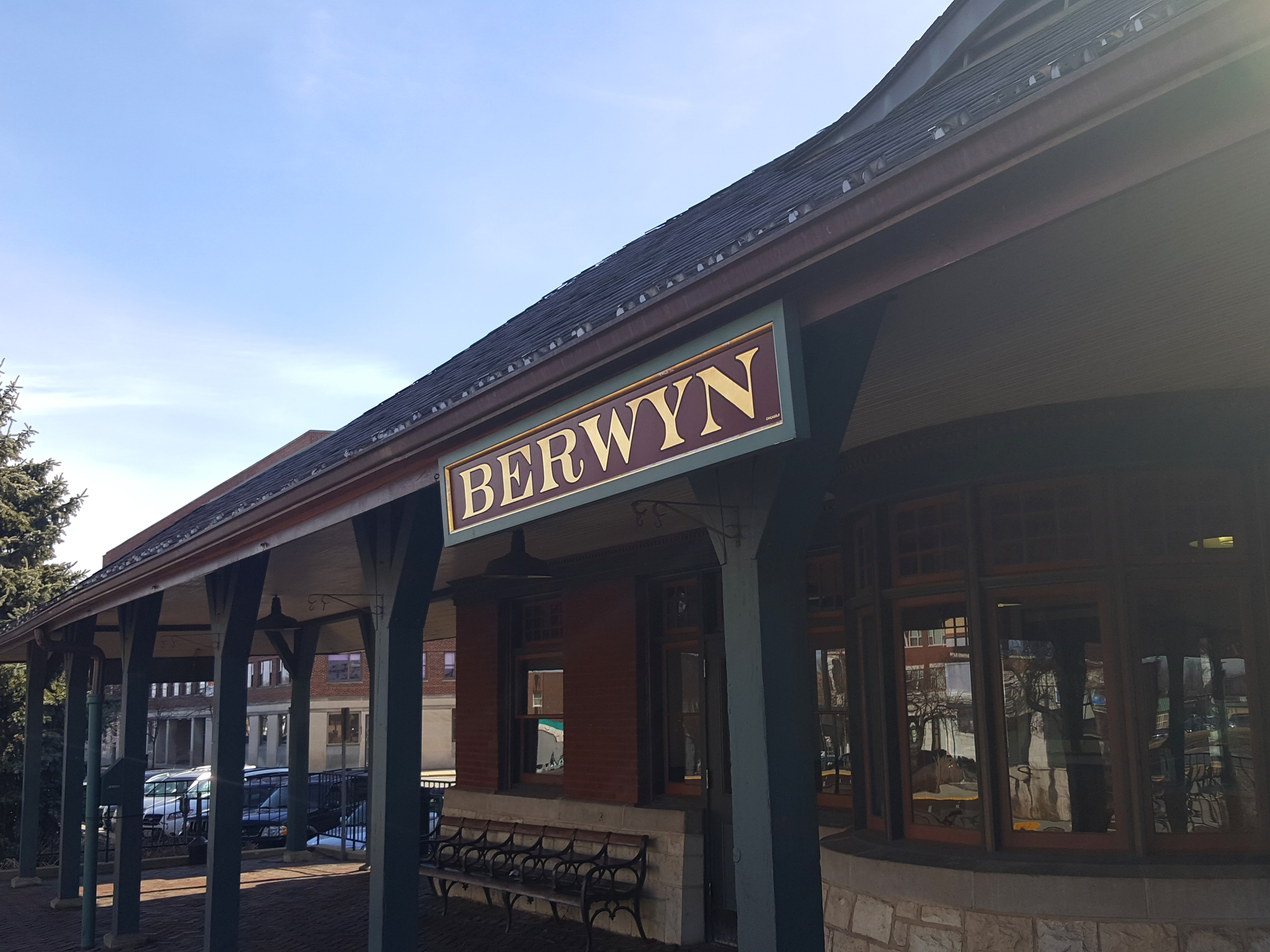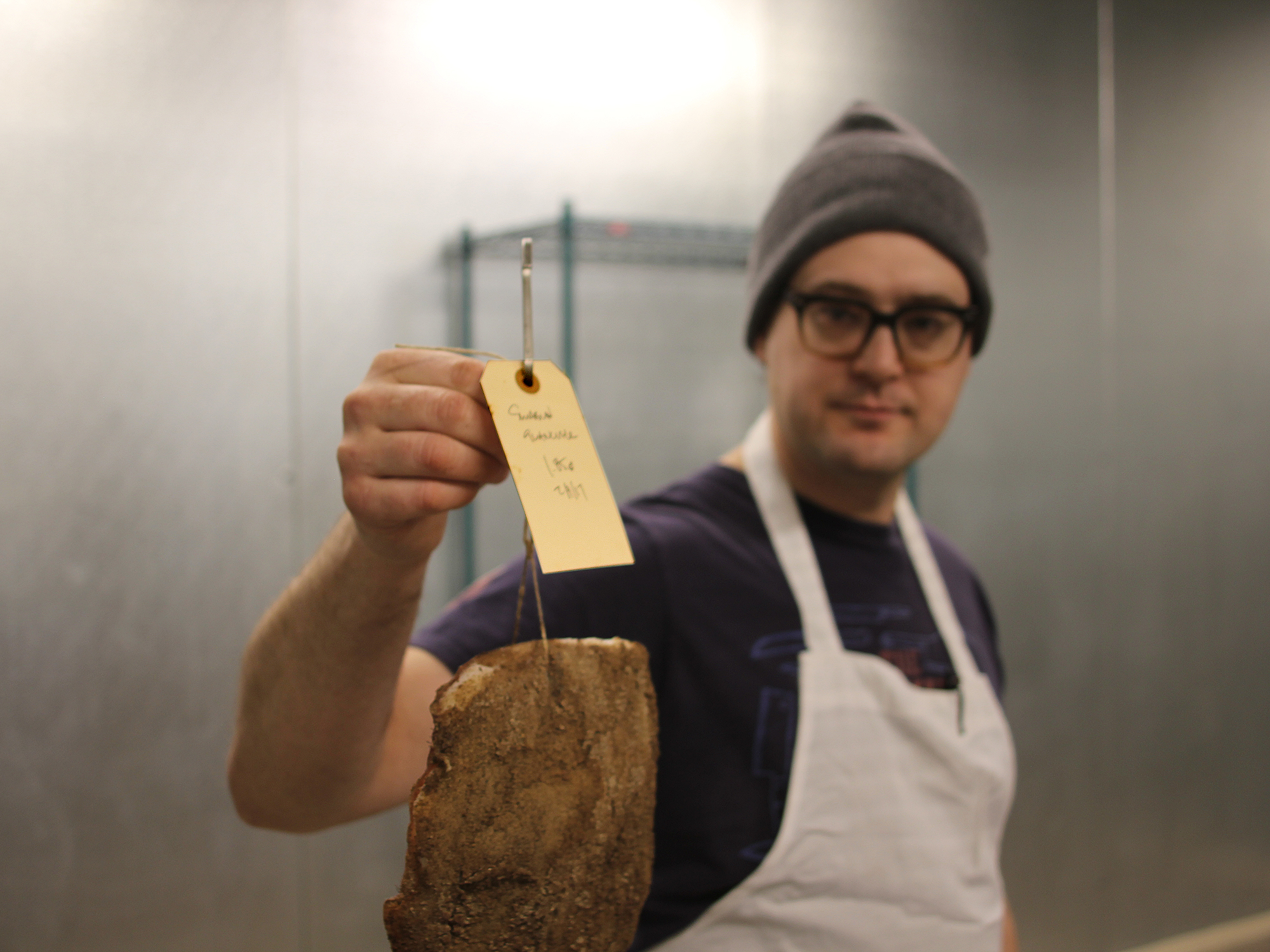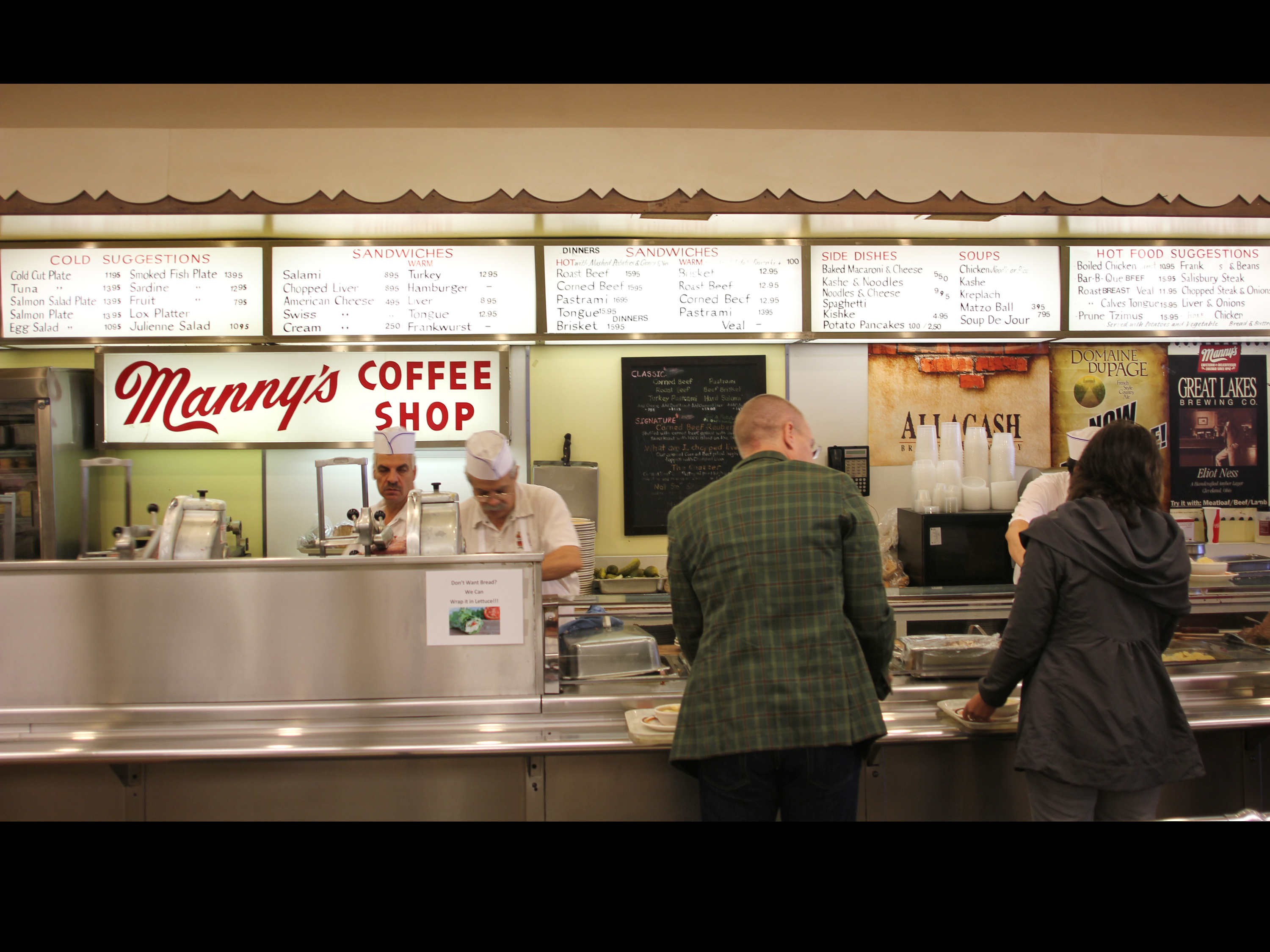YOU KNOW THE DRILL. BELOVED Bakery X (or Restaurant X or Bookstore X), open for decades, announces it can no longer stay in business. Once the shock and collective “Nooo!” subside, the drawn-out goodbye begins. The customers, some of whom sheepishly admit they haven’t been to Bakery X in years, come in droves, stocking up like New Yorkers bracing for two inches of snow and snapping triumphant I-made-it selfies.
It just happened at Swedish Bakery in Andersonville, a Clark Street fixture for the past 88 years. The family-owned operation—most of the old ones are—announced in early February on Facebook that its run was over. Feb. 28, Paczki Day, was its last, giving customers old and new a little more than three weeks to get their fill of marzipan and sweet rolls. Like clockwork, the people did just that.
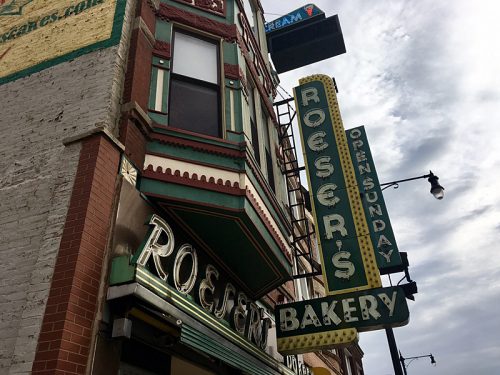
They don’t make signs like this anymore
“THAT’S THE PROBLEM,” SAYS JOHN Roeser IV, the fourth-generation proprietor of Roeser’s Bakery in Humboldt Park, during a chat in the bakery’s cramped basement office one morning just before Swedish Bakery closed. “All the people going there right now. Where were they the last few years?”
Opened in 1911, Roeser’s is the oldest, or maybe second oldest, bakery in Chicago. (Roeser IV says there’s a friendly feud between his family and the Original Ferrara Bakery on Taylor Street as to who’s oldest. Ferrara’s opened in 1908, but in a different location. Roeser IV argues that Roeser’s roots go back to 1907—more on that later—and that Ferrara’s is now more of a lunchtime restaurant than solely a bakery. Anyway, they’re both old.)
The Roesers and the Stantons, who owned Swedish Bakery, are friends, too. So the youngest Roeser’s analysis of human behavior in the face of a bakery crisis is neither unfounded nor unappreciated.
“I was informed before anybody else was,” Roeser says of Dennis Stanton’s decision to close the bakery his mother, Marlies Stanton, bought in 1979 from the previous owner and has run since then. “Was I shocked? Not really, to be quite honest, given his situation.”
Dennis Stanton is close to retirement age and his mom, “she’s one of those stubborn people who really wants to stick around, wants to be there every day, wants to work. But I think the rest of the family is like, ‘Hey, you can’t really do this anymore,’ “ says Roeser.
And there’s the issue of no successor to the family business. “Unlike my father, [Dennis Stanton] doesn’t have a child to take over the business, so that becomes a problem. It’s very hard to sell to somebody else and have them keep your name. If they’re not doing it the way you do it, if they’re not upholding your good reputation, then it becomes a tough situation.”
The Cronut? “We’ve been doing it since 1980. We don’t call it that but we’ve been frying and glazing croissants for over 30 years.”
Roeser is 28. He officially succeeded his dad as owner last year. Retirement is nowhere near on the horizon. But it’s hard, especially now, not to put his future self in Dennis Stanton’s position, to ask the hypotheticals: What if the price of eggs skyrockets again? What if the minimum wage hike is too much too bear?
What if there ends up being no Roeser V?
“I think about it of course. It’s way too early to have an answer right now,” he says. “But if I don’t have a Roeser to succeed me… “ He pauses. “I don’t think I’d have somebody else operate it as Roeser’s.”
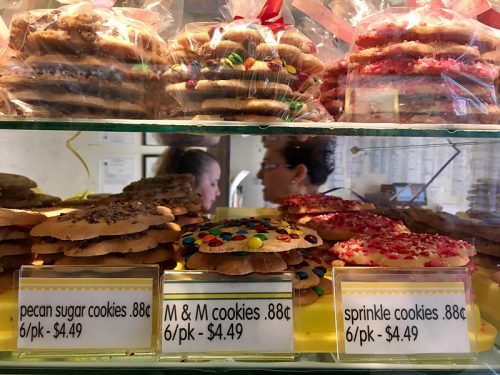
IN 1907, GERMAN IMMIGRANT JOHN Roeser Sr. opened a wholesale bakery at Chicago and Wells. He and his business partner had two horse-drawn wagons, a sign of success, his great-grandson says.
But after a few years, Roeser Sr. got the itch to be on his own and in 1911, he bought the three-story Victorian building at 3216 W. North Ave. Back then, Germans and Scandinavians lived in the neighborhood. Italians and Jews came in the 1930s and 40s. Residents relied on bakeries within walking distance for their daily servings of bread and conversation.
“When my grandfather was in the prime of his career, there were 12 bakeries from Kedzie to Pulaski on North Avenue,” says Roeser IV.
John Roeser Jr. grew up in the business and took over from his dad in 1936. The pattern would repeat twice, with John Roeser III taking the reins in 1976 and Roeser IV last year, after his dad retired.
With each passing of the torch, the neighborhood shifted. The 1960s saw an influx of Puerto Rican residents, followed by Mexicans. By 2000, when Roeser IV wasn’t yet old enough to drive but was washing dishes and cleaning the floor at the bakery, Latinos accounted for nearly half the population in Humboldt Park.
You could track the neighborhood’s evolution by the contents of the pastry case at Roeser’s.“Before our Puerto Rican clientele, we weren’t making a pineapple roll,” says Roeser IV. “When my grandpa was here, prune and poppyseed rolls were really popular.”
The custom cake side of the business, meanwhile, got a major boost in the 1970s, thanks to “Bozo’s Circus,” a hit TV show at the time. In the show’s Grand Prize Game, where kid contestants tossed a ball into numbered buckets, “We were Bucket Number Two. You won a 12-inch cake from Roeser’s if you got Bucket Number Two,” Roeser says.
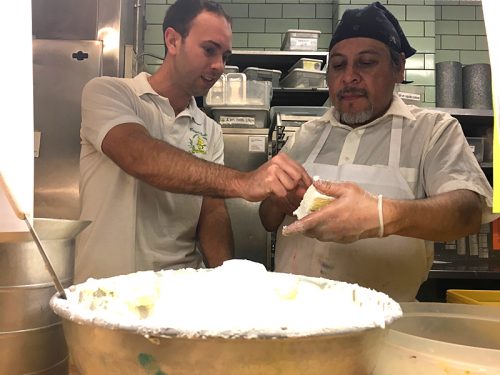
Roeser IV and baker Enrique Ramos talk about the ratio of cake to frosting
HUMBOLDT PARK IS A TRUE MELTING pot now, with hipsters the latest group in the mix. Through it all, Roeser’s has retained its pastry-for-the-people ethos. In the cases, there are maple bacon Long Johns and guava-filled pastelillos and tall German chocolate and tres leches tortes and jumbo sugar cookies with emoji happy faces piped in icing. You don’t come here for difficult pastries made with locally milled flour. You come, you take a number, you wait, especially on a Saturday, you leave with something sweet and doughy and totally familiar. A tin of Altoids costs more than a Roeser’s doughnut.
“Part of the reason we’ve been here for so long is we offer a little something for everybody,” Roeser says.
He prides himself on avoiding fads, or unwittingly starting them. The Cronut? “We’ve been doing it since 1980. We don’t call it that but we’ve been frying and glazing croissants for over 30 years. It’s not in the shape of a doughnut, but that’s what it is.”
You’ll still find prune and poppyseed this-and-that at Roeser’s, though in far fewer numbers as before. “There could be, and I know there are, one, two, three people who come in just for the prune kolachy, so I don’t want to stop making that, because then that person is not going to be happy,” he says.
Roeser says he always wanted to follow his dad into the business and never felt pressure to do so. He recalls a picture he drew of the bakery when he was 7, titled “How my dad dose[sic] his job.”
He earned a degree in hospitality management at the University of South Carolina and did a four-month technical program at the American Institute of Baking in Manhattan, Kansas before returning to Chicago. He’s worked every shift and job: 8 p.m. to start the doughs, 2 a.m. baker, 4 a.m. baker, plumber, HVAC guy. His day now starts around 6 a.m. and usually ends by 7 p.m.
Ask him for the price of anything on the menu, say, a 9-inch cake. He doesn’t hesitate. “Nine inch, two layer, strawberry-filled, which is our most popular, whipped cream iced. $38.75 with tax. A 10-inch is $48.47. That comes with limited decoration.”
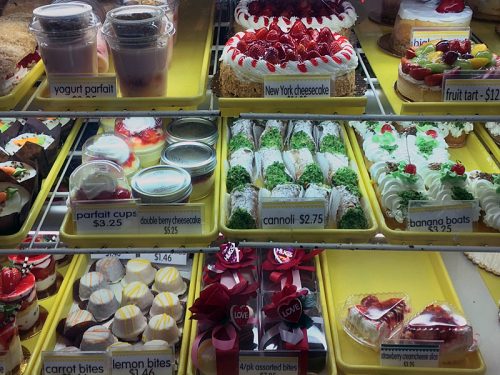
There’s a little bit of everything in the case at Roeser’s
Ask him to talk about his favorites, the ones anyone who’s never been to Roeser’s should try. “Our carrot cake is honestly the best carrot cake I’ve ever had… Our cinnamon rolls are awesome. We have a cheese fry, with this sweet baker’s cheese. Our custard pecan coffeecake is to die for…” He could go on.
Roeser IV has 32 employees, many of whom have watched him grow up. Customers have, too. “The ones who drive in from Gurnee and Indiana, they’re the ones who knew my grandpa. We get them at the holidays because they need their linzer torte or a certain pie or stollen,” he says.
Jennifer Rey, 36, used to live in the neighborhood. She’s a 10-minute drive away now, but she still comes to order cake for family parties, as she did on a recent weekday morning. Four other customers were doing the same, each paging through cake catalogs while discussing their orders with employees behind the counter.
“The only place that does birthday cakes close to me is Pete’s Fresh Market and I’m not about to go there,” Rey says. “I’ve been coming for, like, over 18 years. Strawberry Shortcake, that was the first cake I ordered here. It was shaped like a treehouse, for my daughter’s 5th birthday, her golden birthday.”

Torte layers, ready to be stacked
STILL, ROESER SAYS, CUSTOMERS IN general just aren’t coming around like they once did, and they’re ordering fewer and smaller custom cakes. “We used to do 300 [custom cakes] on a Saturday. We didn’t have enough space to put ‘em. Now, it’s 150,” he says.
The 9/11 attacks, the loss of manufacturing in the area, the most recent avian flu outbreak, which sent the price of eggs soaring—the bakery has taken its hits through the years. It’s these external factors out of his control that are always on Roeser’s mind.
“We’re doing okay. I wouldn’t say well, but that’s because I’m a perfectionist. Of course I worry. Every day. But I don’t worry because I think it’s something we’re not doing right,” he says.
Here is what Roeser IV would one day like to do: build out a cafe with seating, so he can serve bacon, eggs and croissants, ham on ciabatta, sandwiches, that sort of thing. “I see us bigger. We need more space here,” he says.
More immediately, once things settled down, if Dennis Stanton at Swedish Bakery could catch a break, Roeser said he would like to pay him a visit and see about buying some of his equipment.
Before that could happen, though, they both had to get through Paczki Day. You know the drill.
Janet Rausa Fuller is a former Sun-Times scribe and a current consumer of yeast-raised sweet things.
Latest
Join the Discussion
After you comment, click Post. If you're not already logged in you will be asked to log in or register with Disqus.




